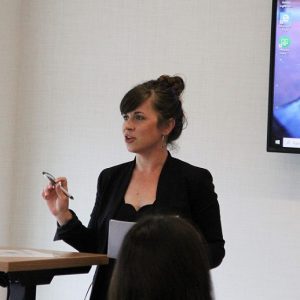About Grace
Grace Noppert is a Research Assistant Professor with the Social Environment and Health Group at the University of Michigan’s Institute for Social Research. She holds a PhD in Epidemiology from the University of Michigan, where she was part of the Center for Social Epidemiology and Population Health. She completed post doctoral training in aging and sociology at the Duke University Center for the Study of Aging and the Carolina Population Center at the University of North Carolina.
Grace’s work lies at the intersection of biology, sociology, and epidemiology. Her work seeks to explain how social processes across the life course, such as socioeconomic status, impact a person’s biology. For example, does experiencing persistent disadvantage throughout life contribute to premature aging of the immune system?
She began her work as an infectious disease epidemiologist examining health disparities in tuberculosis (TB) in the U.S. Her work has consistently documented a strong social component underlying the distribution of TB. Those most vulnerable in the U.S. population are bearing the greatest burden of TB. Her current work now focuses on persistent viral infections (example: CMV, HSV-1, etc) and how they may be aging the immune system prematurely. However, in order to fully grasp the impact of these infections you have to look at the social environment. Understanding the link between social factors, infections, and immune function may hold clues to explaining persistent health disparities across the life course.
Grace began her career as a middle and high school science teacher in Baltimore, MD. Her short time in the classroom forms the basis for many of the questions Grace asks in her work today. Her students in Baltimore were remarkable young people, resilient in the face of many challenges facing them. Many of her students lacked basic opportunities to achieve health and wellness, opportunities such as healthy neighborhood environments and adequate food and housing. The stories of her students and families in Baltimore continue to inform the questions Grace currently asks in her research.
